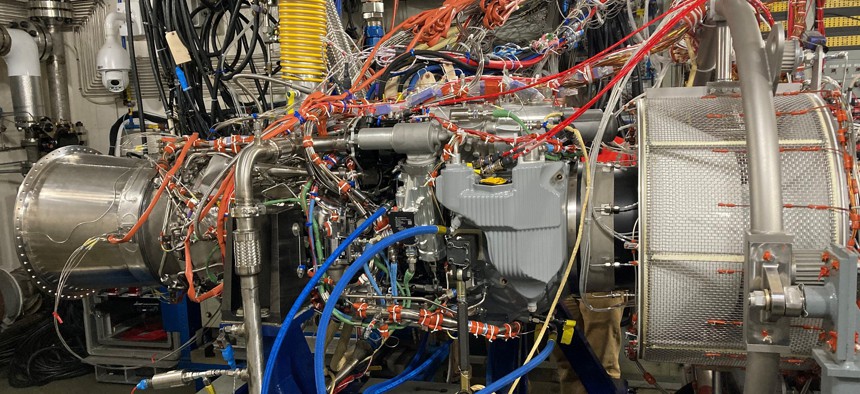Army Finishes Early Testing of Next-Generation Helicopter Engine

A General Electric T901 engine undergoing testing. GE
The General Electric power plants will be installed in the Future Attack Reconnaissance Aircraft.
The U.S. Army finished an early round of testing of a new General Electric-built engine that is expected to power its future helicopters and improve the range and performance of its Black Hawks and Apaches.
While it will still be months before the engine, called the T901, lifts an aircraft off the ground, completion of critical tests last month paves the way for the companies designing a new generation of helicopters to receive engines for prototypes already under construction. Bell is competing against Sikorsky to build the Future Attack Reconnaissance Aircraft.
During three months of tests, which were delayed due to the pandemic, the T901 ran for more than 100 hours, the Army said.
“The event successfully verified and validated performance models on the Army's next-generation rotorcraft engine that will power the Boeing AH-64 Apache, the Sikorsky UH-60 Black Hawk, and the Future Attack Reconnaissance Aircraft,” the Army said in an emailed statement.
The engine will undergo a “multi-year test campaign” before it reaches “full Army qualification.” Still, the helicopter prototypes under construction now are expected to fly with the new engines as soon as 2023.
“These standards ensure an engine meets Army requirements for design, production, and continuing airworthiness, and will encompass approximately 1,500 engine test hours,” the Army said. “In total, the T901 will undergo nearly 5,000 hours of testing to achieve full engine qualification.”
The new, more powerful, reliable and efficient engines have been in the works for more than decade. The Army chose the GE T901 engine over a Pratt & Whitney and Honeywell power plant in 2019.
In addition to powering the new Future Attack Reconnaissance Aircraft, the engine will eventually be installed on the Black Hawks and Apache helicopters that will remain in the Army inventory for years to come. The new T901-powered Black Hawk is not expected to fly until 2027, according to Army budget documents.
NEXT STORY: CFPB Expands Technologist Hiring Program






